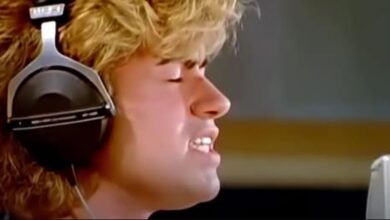Pink Floyd’s “Brain Damage / Eclipse” – A Musical Odyssey
“Brain Damage/Eclipse” is a two-part composition that concludes Pink Floyd’s iconic album “The Dark Side of the Moon,” released in 1973. These tracks are celebrated for their innovative approach to music, thought-provoking lyrics, and their significant role in the concept album that explores themes of mental illness and the human condition.
Musically, “Brain Damage” begins with ethereal and somewhat unsettling sounds, including laughter and voices. It leads into a melodic section featuring keyboards and acoustic guitar, gradually building in intensity. The song’s haunting melody and lush vocal harmonies create a sense of melancholy and contemplation. “Eclipse” follows “Brain Damage” seamlessly, serving as a powerful climax to the album. It features a grand choral arrangement and serves as a culmination of the album’s themes, encapsulating the idea that life’s experiences are interconnected.
Lyrically, “Brain Damage” touches on themes of mental instability and the sense of alienation, often associated with the pressures of modern life. The song is particularly known for the iconic line “The lunatic is on the grass,” which captures the album’s overarching concept of the dark side of the human psyche. “Eclipse” provides a sense of resolution, emphasizing unity and the idea that “All that you touch, you change. All that you change, changes you.”
“Brain Damage/Eclipse” is widely regarded as one of Pink Floyd’s greatest achievements and a pivotal moment in the history of progressive rock. It has been praised for its lyrical depth, intricate musical arrangement, and the album’s overall thematic coherence. The two tracks together serve as a fitting conclusion to “The Dark Side of the Moon,” making it one of the most memorable and thought-provoking musical experiences in rock history.





